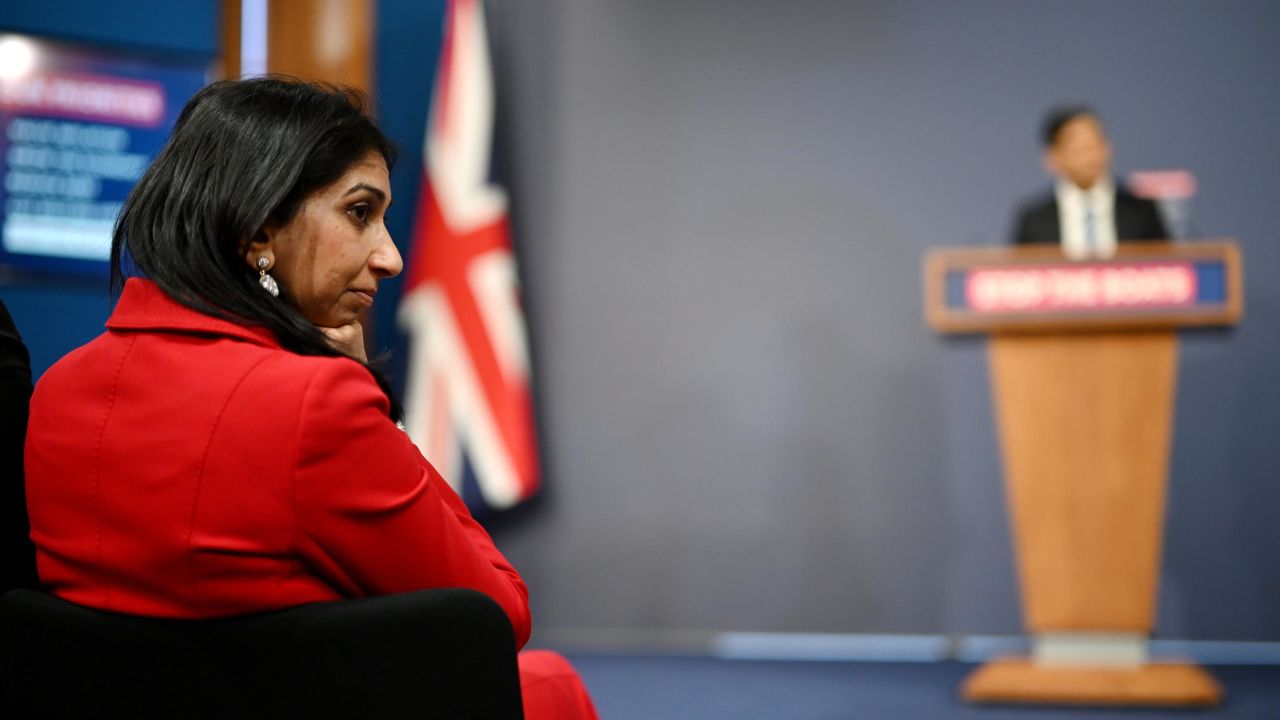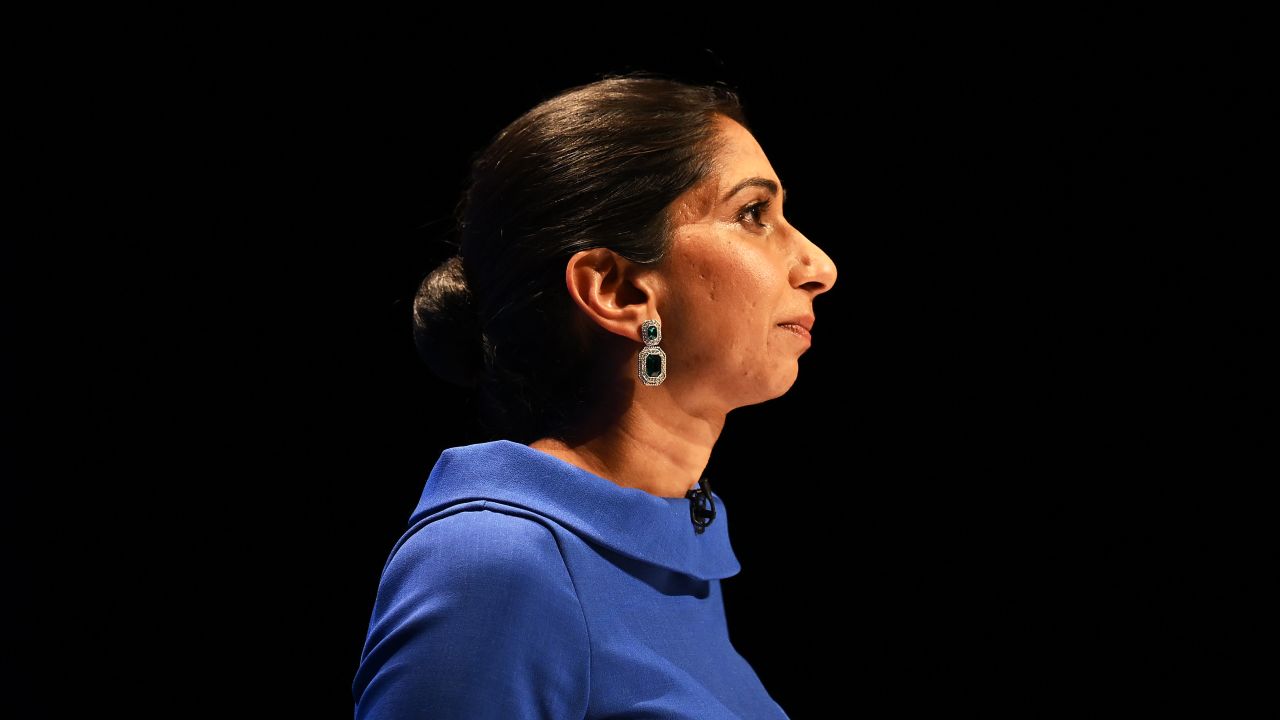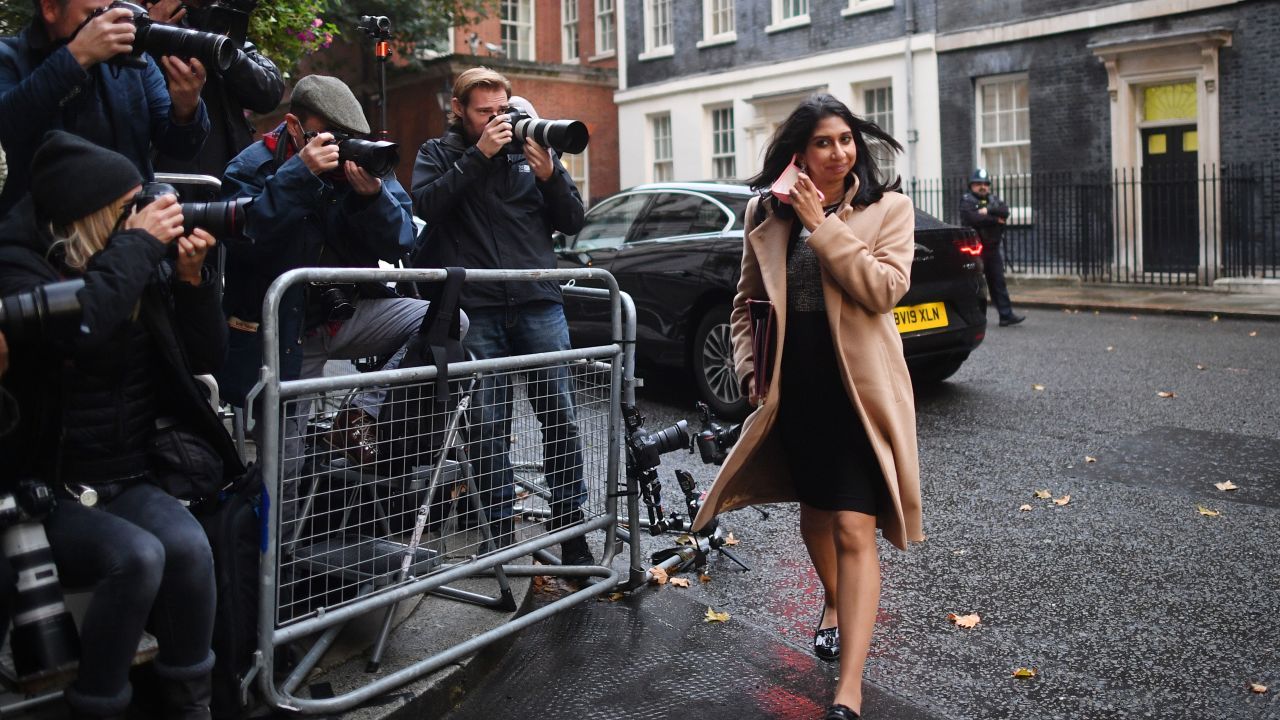‘A Trump tribute act’: Meet Suella Braverman, the commander-in-chief of Britain’s culture wars

Late last year, after a breakneck ascent of British politics put her in charge of the country’s migration, crime and national security agenda, Suella Braverman revealed her political fantasy.
“I would love to (see) a front page of The Telegraph with a plane taking off to Rwanda,” the home secretary (interior minister) told that newspaper, referring to her controversial efforts to deport asylum-seekers to the central African nation. “That’s my dream. That’s my obsession.”
Braverman is no stranger to the front pages. Her self-proclaimed “obsession” with curbing migration – and the loaded and occasionally inflammatory language she uses to address it – has attracted forceful criticism from international agencies, lawyers, rights groups and many of her own colleagues, making her arguably Britain’s most divisive politician.
But among Conservative Party members and the chief architects of Brexit, she is a star; someone who is prepared to say and do controversial things in pursuit of a singular goal.
“She’s the cutting edge of the populist, radical right-wing strain in the Conservative Party,” Tim Bale, a professor of politics at Queen Mary University in London, and the author of books on the party, told CNN.
“In a way, that allows her to say what some Conservative MPs would think of as the unsayable.”
Braverman has railed against what she calls an “invasion” of migrants, holding “values which are at odds with our country” – and suggested she would break international law to deport them from Britain.
And she is an equally furious culture warrior, borrowing rhetoric from the American right when lambasting “woke” culture, transgender rights and climate protesters.
“She’s recognized that in the current political climate, her way of creating an impact… (is) positioning herself as a Trump tribute act,” migration policy expert and campaigner Zoe Gardner told CNN.

But Braverman has speedily made herself a central figure in British politics; the assassin of Liz Truss’s premiership and the kingmaker of Rishi Sunak’s, she has made evident her desire to ultimately enter Downing Street as prime minister herself – a prospect that sits uneasily with much of the country’s political establishment.
A ‘cruel and dangerous’ migration agenda
Braverman, who evangelizes on the benefits of Brexit and has made migration curbs her political mission, has a backstory that seems to teem with contradictions.
She is the daughter of migrants, who wants to cut net migration to Britain to the “tens of thousands.” Her parents, both of Indian origin, arrived in the country from Kenya and Mauritius “with very little” in the 1960s.
She was a practicing lawyer before entering politics, but has displayed an unabashed indifference about whether her flagship migration bill complies with international law.
And she is an avid Francophile, sometimes speaking in French when meeting her counterpart in Paris, who championed the project to leave the European Union. Braverman says she fell in love with France while studying at the renowned Sorbonne university in Paris, taking advantage of the EU’s Erasmus program that encourages students to spend time in other parts of the continent. Brexit shut the program off to British students.
Now, she has staked her political reputation on her ability to “Stop the Boats” – an oft-repeated government pledge, borrowed from Australia’s hardline rhetoric towards asylum-seekers, to reduce the growing number of migrants crossing the English Channel on small vessels.

It is a stance that has drawn sharp criticism – including from within the traditional wing of Braverman’s Conservative Party.
“Braverman has placed far too much emphasis on curbing migration,” said Ben Ramanauskas, an economist and adviser to Truss when the previous prime minister was secretary of state for international trade. “Her priority seems to be attempting to be as cruel as possible.”
The government’s flagship bill, which was approved by MPs last week but faces scrutiny in the House of Lords, essentially hands the government the right to deport anyone arriving illegally in the United Kingdom. “It’s incredibly dangerous, hostile, cruel, and fundamentally unworkable,” Gardner said.
And experts say it deliberately misses the point. “Deterrents don’t work… There is absolutely no correlation whatsoever between how brutally we respond to migration, and the numbers of people forced to move,” Gardner said. “We need a functioning asylum system where we process people’s claims, (and) we need to give people safe routes in order to travel.”
Braverman, however, is steadfast in the face of criticism. The Home Office told CNN in a statement that her bill “will break the business model of the people smuggling gangs and restore fairness to our asylum system. It will ensure anyone arriving via small boat or other dangerous and illegal means will be in scope for detention and swiftly removed.”
Braverman’s plans have won praise from Europe’s leading populist figures, including Italy’s hardline deputy leader Matteo Salvini and French far-right presidential candidate Eric Zemmour.
But that is company many in the Conservatives feel uncomfortable keeping.
“The UK’s ability to play a role internationally is based on our reputation – not because we’re British, but because of what we stand for and what we do,” ex-Prime Minister Theresa May said in a stinging intervention in the House of Commons last month. May added last week that the bill’s removal of modern slavery protections “will consign victims to remaining in slavery.”
And Sayeeda Warsi, the first Asian chair of the Tory party, has attacked what she described as Braverman’s “racist rhetoric,” after Braverman prompted controversy by singling out British Pakistani men when attacking grooming gangs in the country.
“Braverman’s own ethnic origin has shielded her from criticism for too long,” Warsi wrote in The Guardian. “Black and brown people can be racist too.” The Home Office told CNN that Braverman “has been clear that all despicable child abusers must be brought to justice. And she will not shy away from telling hard truths, particularly when it comes to the grooming of young women and girls in Britain’s towns who have been failed by authorities over decades.”
War on the ‘wokerati’
Braverman fronts a newer, more populist streak in the UK’s ruling party – a move that has troubled some of its grandees but has found an audience among voters.
“The voters that she’s appealing to is the majority of the British public,” said James Johnson, who ran polling in May’s Downing Street operation and later founded the JL Partners pollster. “There is a very significant disconnect between what people on Twitter about immigration, and what people actually think about immigration.
“Voters do not react to (Braverman’s) language with the same outrage that some people do,” he told CNN. “(They) want their politicians to at least be trying.”
Polling shows that approval of Braverman’s tough stance on migration significantly outpaces support for the government in general – as well as approval of Braverman herself – with research often indicating that a slim majority of the public supports her plans.
And those who support her – particularly those in Euroskeptic circles, where she is almost revered – say Braverman speaks to the concerns of modern Britain in a way that her more seasoned critics cannot. “When finally even I wobbled about backing Brexit in name only, Suella stood firm,” prominent Brexit backer Steve Baker said when he supported her leadership campaign last year, praising Braverman’s resolve to defeat May’s Brexit deal and push for a harder-line departure from the EU. “It wouldn’t have happened without her.”
But research has also shown that the importance of immigration to British voters has receded since the bitter debates of the mid-2010s.
It appears inevitable that the Tories will seek to make migration a wedge issue at the next election, ensuring Braverman plenty of airtime as the government looks to draw a contrast between itself and the Labour party. But a series of brutal electoral results in local polls on Thursday will further fuel questions about whether that is a winning strategy.

Braverman’s political coming-of-age took place just as the 2016 EU referendum shifted the tectonic plates underneath Westminster, giving younger, Euroskeptic voices like hers an inroad with the public.
It was Braverman’s role fronting an anti-EU backbench committee that “propelled her to her (current) position, and she knows it,” former Conservative MP Antoinette Sandbach told CNN.
Today, she takes the populist mantle further than many of her peers on a range of matters far beyond Brexit. Braverman appears to relish “culture war” confrontations with her political enemies like few other frontline politicians; “you almost feel sometimes that she gets a kick out of ‘owning the libs,’” the politics professor Bale told CNN.
She has taken aim at the “Guardian-reading, tofu-eating wokerati” from the despatch box, and insisted she will “not be hectored by out-of-touch lefties.” In 2019, she said she considers herself engaged in a “battle against cultural Marxism.”
Braverman’s Home Office recently reportedly backed two pub landlords who refused to remove their minstrel-style children’s toys that are considered a racist relic of the 1970s. And she has criticized police officers for “virtue signaling,” saying in a speech last week that “they shouldn’t be taking the knee.”
But those battles have left some traditional Tories cold. “The Conservative Party has moved right since I joined, and become much more like the MAGA Republicans” since the dividing line of 2016, said Sandbach, who was expelled from the party by Boris Johnson after trying to avert a no-deal Brexit. She subsequently joined the Liberal Democrats.
Leadership ambitions
Those who worked alongside Braverman describe her as friendly and personable, and few doubt her ambition.
As 23-year-old Suella Fernandes, she nearly ran against her own mother to become the Tory candidate in a 2003 by-election, until the elder Fernandes – a Conservative councilor and NHS nurse – persuaded her to pull out.
Braverman succeeded in becoming an MP in 2015. In a series of tweets that bemoaned her “lamentable hopelessness,” one of her more critical backbenchers, William Wragg, claimed she asked in her first week in Parliament whether she could expense a fine for speeding.
But her determination to drive towards power has served her well. No politician emerged more triumphant from the psychodrama that has transfixed British politics than Braverman, who started 2022 as attorney general and ended it a household name – having served in three different Cabinets, twice as home secretary.
An initial departure from frontline politics theoretically came amid scandal (Braverman resigned for breaching ministerial rules by using a private email address), but her scathing parting letter turned her misconduct into a maneuver, essentially pulling the plug on Truss’s shambolic tenure.
“I have made a mistake; I accept responsibility: I resign,” Braverman wrote, in a thinly veiled attempt to contrast herself with Truss. Six days later she was back in the same post, having aligned herself with Sunak’s successful leadership bid.
Few doubt Braverman’s long-term ambitions. “You have to interpret everything Suella Braverman does and says in the light of the leadership contest that many people assume will take place if… Sunak were to lose the next election,” Bale said.
Crucial to that target is her reputation among party members and its more hardline MPs. It is those groups that pick a party leader, and she is met enthusiastically by grassroots Conservatives who tend to reflect the more right-wing, populist traits of the bloc.
That prospect undoubtedly perturbs some. “There will be many Tory MPs who simply could not stomach her as leader,” Bale added. “I think the lack of support she received in her leadership bid (last year) reflects how she was seen by the party as a whole,” Sandbach said.
Nevertheless, Braverman is storming up the approval rankings among ordinary Conservative members. In its latest monthly league table of Cabinet ministers, the ConservativeHome website – widely regarded as having its finger on the pulse of the grassroots party – puts Braverman fourth from the top with a net approval rating of 47.8. Only last November, she was sixth from bottom in the site’s regular survey of party members. “The panel seems to have decided that if the Government fails to stop the boats it won’t be for want of the Home Secretary trying,” wrote the website’s editors in April.
Should Braverman succeed at her next bid for the party leadership, her critics fear another rightwards shift in British politics.
“Braverman has taken some cues from the US, and also from history,” Gardner said.
“She’s setting herself up to lead a more extreme, right-wing populist version of the Tory party.”
No comments: